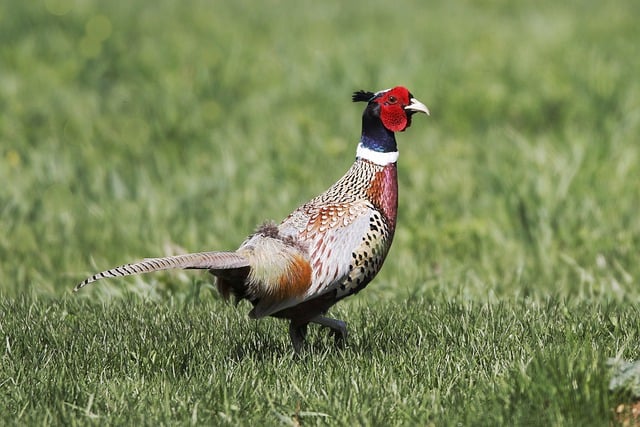In the Bible, the pheasant is not specifically mentioned. However, in Christian symbolism, the pheasant is often associated with qualities such as beauty, grace, and abundance. The bird’s vibrant colors and elegant appearance are seen as a reflection of God’s creativity and the beauty of His creation. Additionally, the pheasant’s ability to thrive in various environments and its resourcefulness in finding food are seen as symbols of God’s provision and care for His creatures. Overall, the pheasant can be seen as a reminder of the beauty and abundance that God provides in the world.
Table of Contents
Pheasant as a Symbol of Prosperity in the Bible
Have you ever come across a pheasant in the Bible and wondered what it symbolizes? Pheasants are not as commonly mentioned in the Bible as other animals, but they do hold a significant meaning when they do appear. In this article, we will explore the biblical symbolism of a pheasant, particularly in relation to prosperity.
In the Bible, pheasants are often associated with abundance and prosperity. This symbolism can be traced back to the Old Testament, where pheasants were considered a symbol of wealth and luxury. Pheasants were often served at lavish feasts and banquets, signifying the host’s wealth and status.
One of the most famous references to pheasants in the Bible can be found in the book of Deuteronomy. In Deuteronomy 14:5, pheasants are listed among the clean birds that the Israelites were allowed to eat. This distinction between clean and unclean animals was important in the Jewish dietary laws, and pheasants were considered a delicacy that only the wealthy could afford.
The association of pheasants with prosperity can also be seen in the New Testament. In the Gospel of Luke, Jesus tells a parable about a rich man who stored up his wealth in barns, only to have his life taken from him that very night. In this parable, the rich man is compared to a pheasant, whose abundance and wealth ultimately lead to his downfall.
The symbolism of pheasants as a sign of prosperity is not limited to the Bible. In many cultures around the world, pheasants are considered a symbol of good fortune and wealth. In Chinese culture, for example, pheasants are believed to bring luck and prosperity to those who encounter them.
So what can we learn from the biblical symbolism of a pheasant as a symbol of prosperity? One interpretation is that material wealth and abundance are not necessarily a sign of true prosperity. The rich man in Jesus’ parable may have had all the material possessions he could desire, but he neglected to cultivate spiritual wealth and ultimately lost everything.
Another lesson we can take from the symbolism of pheasants in the Bible is the importance of gratitude and humility. While pheasants may symbolize wealth and abundance, they are also creatures of beauty and grace. By appreciating the beauty and blessings in our lives, we can cultivate a spirit of gratitude that transcends material wealth.
In conclusion, the biblical symbolism of a pheasant as a symbol of prosperity reminds us that true wealth is not measured by material possessions alone. By cultivating a spirit of gratitude, humility, and generosity, we can experience true prosperity in all areas of our lives. So the next time you come across a pheasant in the Bible, remember the lessons it can teach us about the true meaning of prosperity.
The Spiritual Significance of Pheasants in Biblical Texts
Pheasants are beautiful and majestic birds that have captured the attention of humans for centuries. In addition to their physical beauty, pheasants also hold spiritual significance in various cultures, including in the Bible. The Bible is full of symbolism and hidden meanings, and pheasants are no exception. Let’s explore the biblical meaning of pheasants and what they represent in the spiritual realm.
In the Bible, pheasants are often associated with abundance and prosperity. This symbolism can be traced back to the Old Testament, where pheasants were considered a symbol of wealth and luxury. Pheasants were often served at lavish feasts and banquets, signifying the host’s wealth and status. In this context, pheasants represent God’s provision and abundance in our lives.
Furthermore, pheasants are also associated with beauty and grace in the Bible. The vibrant colors and intricate patterns of a pheasant’s feathers are a testament to God’s creativity and attention to detail. Just as God has adorned the pheasant with beauty, He also adorns us with His grace and love. Pheasants serve as a reminder of God’s beauty and grace in our lives.
Another important biblical symbolism of pheasants is their ability to adapt and thrive in different environments. Pheasants are known for their resilience and adaptability, traits that are highly valued in the spiritual realm. Just as pheasants can thrive in various habitats, we too can overcome challenges and obstacles with God’s strength and guidance. Pheasants symbolize resilience and perseverance in the face of adversity.
Moreover, pheasants are also associated with protection and security in the Bible. Pheasants are known to be fiercely protective of their nests and offspring, willing to defend them at all costs. In the same way, God protects and watches over us, His children, with unwavering love and care. Pheasants symbolize God’s protective presence in our lives, shielding us from harm and danger.
In conclusion, pheasants hold deep spiritual significance in the Bible, representing abundance, beauty, grace, resilience, and protection. As we admire the beauty of these majestic birds, let us also reflect on the spiritual lessons they teach us. Just as pheasants symbolize God’s provision and abundance, may we trust in His provision for our lives. Just as pheasants symbolize God’s beauty and grace, may we embrace His love and grace in our hearts. Just as pheasants symbolize resilience and perseverance, may we trust in God’s strength to overcome challenges. And just as pheasants symbolize protection and security, may we rest in the assurance of God’s protective presence in our lives. Let us learn from the biblical symbolism of pheasants and grow in our faith and trust in God.
Pheasants as Messengers of God in the Bible

Have you ever come across a pheasant in the Bible and wondered what its significance might be? Pheasants are not as commonly mentioned in the Bible as other animals, but they do hold a special symbolism that can offer insight into the messages God may be trying to convey. In this article, we will explore the biblical meaning of a pheasant and how it can be interpreted as a messenger of God.
In the Bible, pheasants are often associated with beauty, grace, and abundance. These birds are known for their vibrant colors and intricate patterns, which can be seen as a reflection of God’s creativity and attention to detail in all of His creations. Pheasants are also known for their elegant and regal appearance, which can symbolize the majesty and glory of God.
One of the key themes associated with pheasants in the Bible is that of provision and abundance. Pheasants are often depicted as symbols of God’s provision for His people, as they are known for their ability to thrive in diverse environments and provide sustenance for those who come across them. In the Bible, pheasants are often used to represent the abundance of God’s blessings and the importance of trusting in His provision.
Another important aspect of pheasants in the Bible is their role as messengers of God. Pheasants are known for their distinctive calls and behaviors, which can be seen as a form of communication from God. In the Bible, pheasants are often used to convey important messages or warnings to His people, reminding them of His presence and guidance in their lives.
Pheasants are also associated with the concept of renewal and transformation in the Bible. These birds are known for their ability to molt and regenerate their feathers, which can symbolize the process of spiritual growth and renewal in the lives of believers. Pheasants can serve as a reminder that God is constantly working in our lives, helping us to shed our old ways and embrace new beginnings.
Overall, pheasants in the Bible can be seen as powerful symbols of God’s provision, guidance, and renewal in the lives of His people. These birds serve as messengers of His love and grace, reminding us to trust in His provision and guidance as we navigate through life’s challenges. Next time you come across a pheasant in the Bible, take a moment to reflect on its symbolism and consider the ways in which God may be trying to communicate with you through this beautiful and majestic creature.
The Symbolism of Pheasants in Biblical Parables and Stories
Have you ever come across a pheasant in the Bible and wondered what its significance might be? Pheasants are not as commonly mentioned in the Bible as other animals, but they do appear in a few parables and stories that hold deep symbolic meaning.
In the Bible, pheasants are often associated with beauty, grace, and abundance. They are known for their colorful plumage and elegant appearance, which can be seen as a reflection of God’s creation and the beauty of the natural world. Pheasants are also known for their ability to thrive in diverse environments, which can symbolize adaptability and resilience in the face of challenges.
One of the most well-known stories involving a pheasant in the Bible is the parable of the mustard seed. In this parable, Jesus compares the kingdom of heaven to a mustard seed, which is the smallest of all seeds but grows into a large tree where birds can come and make their nests. Some interpretations suggest that the birds in this parable, including pheasants, represent the diversity of God’s creation and the inclusivity of his kingdom.
Another story that features a pheasant in the Bible is the story of the prodigal son. In this parable, a young man asks his father for his inheritance and goes off to squander it in a distant land. When he returns home, his father welcomes him back with open arms and celebrates his return with a feast that includes a fattened calf and, in some interpretations, a pheasant. The presence of the pheasant in this story can symbolize abundance, forgiveness, and the joy of reconciliation.
Pheasants are also mentioned in the book of Leviticus as one of the clean birds that the Israelites were allowed to eat. This can be seen as a symbol of purity and holiness, as well as a reminder of God’s provision for his people. The mention of pheasants in this context reinforces the idea that God cares for all creatures, both great and small.
Overall, the symbolism of pheasants in the Bible is rich and varied, reflecting themes of beauty, grace, abundance, adaptability, and inclusivity. Pheasants serve as a reminder of God’s creation and his care for all living beings, as well as a symbol of the richness and diversity of his kingdom.
So the next time you come across a mention of a pheasant in the Bible, take a moment to reflect on its deeper meaning and consider how it might apply to your own life. Just as the pheasant embodies various qualities and symbols in the Bible, so too can it serve as a source of inspiration and reflection for those who seek to deepen their understanding of God’s word.
Interpreting the Biblical Meaning of Pheasants in Christian Faith and Tradition
Have you ever come across a pheasant in the Bible and wondered what its significance might be? Pheasants are not as commonly mentioned in the Bible as other animals, but they do hold symbolic meaning in Christian faith and tradition. Let’s delve into the biblical meaning of a pheasant and explore its symbolism.
In the Bible, pheasants are often associated with beauty and grace. Their vibrant plumage and elegant appearance make them stand out among other birds. This symbolism of beauty and grace can be seen as a reflection of God’s creation and the beauty that surrounds us in the natural world.
Pheasants are also known for their ability to adapt to different environments and thrive in various habitats. This adaptability can be seen as a symbol of resilience and strength in the face of challenges. Just as pheasants are able to navigate different landscapes, Christians are called to adapt and grow in their faith, no matter the circumstances.
Another aspect of the biblical meaning of a pheasant is their association with abundance and prosperity. In some cultures, pheasants are seen as a symbol of good fortune and wealth. This symbolism can be interpreted in a spiritual sense as well, representing the blessings and abundance that God provides to those who trust in Him.
Pheasants are also known for their distinctive call, which can be heard echoing through the forests and fields. This call can be seen as a symbol of communication and connection. In the same way, Christians are called to communicate with God through prayer and seek a deeper connection with Him.
The pheasant’s ability to fly and soar through the skies can also be seen as a symbol of freedom and liberation. Just as the pheasant is free to roam the skies, Christians are called to live in freedom through their faith in Christ. This freedom allows believers to break free from the chains of sin and experience true liberation in God’s love.
Overall, the biblical meaning of a pheasant encompasses beauty, grace, adaptability, abundance, communication, freedom, and prosperity. These symbols can serve as a reminder for Christians to embrace these qualities in their own lives and strive to live in accordance with God’s will.
As you encounter a pheasant in the Bible or in the natural world, take a moment to reflect on its symbolism and consider how it might apply to your own faith journey. Allow the beauty and grace of the pheasant to inspire you to live a life of abundance, resilience, and freedom in Christ.
Conclusion
In the Bible, the pheasant is not specifically mentioned, so there is no direct biblical meaning or symbolism associated with this bird. However, some interpretations suggest that the pheasant could symbolize beauty, grace, or abundance, as these are common themes found in biblical teachings. Ultimately, the symbolic meaning of a pheasant in a biblical context would depend on the individual’s interpretation and personal beliefs.
For licensing reasons, we must provide the following notice: This content was created in part with the help of an AI.


